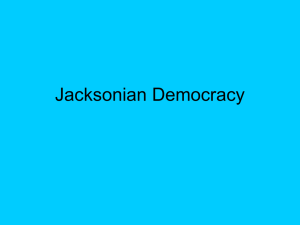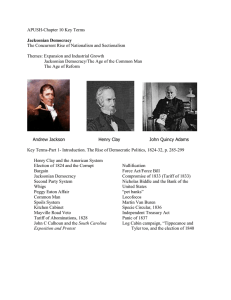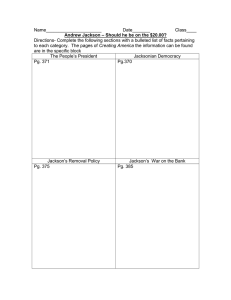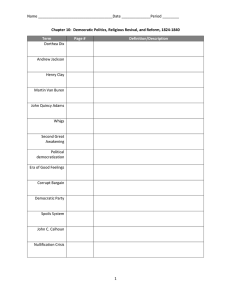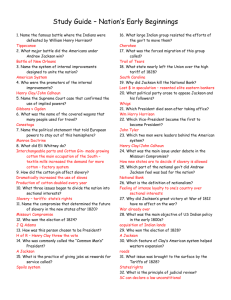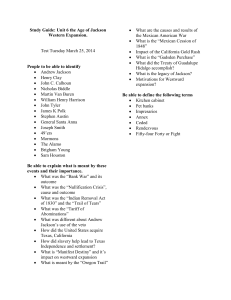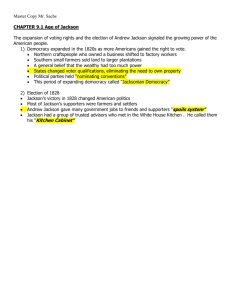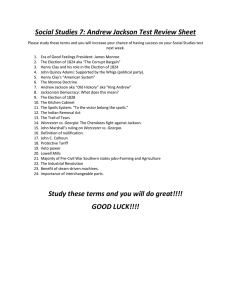– Unit 4, Chapter 13 (12 Ed.)
advertisement
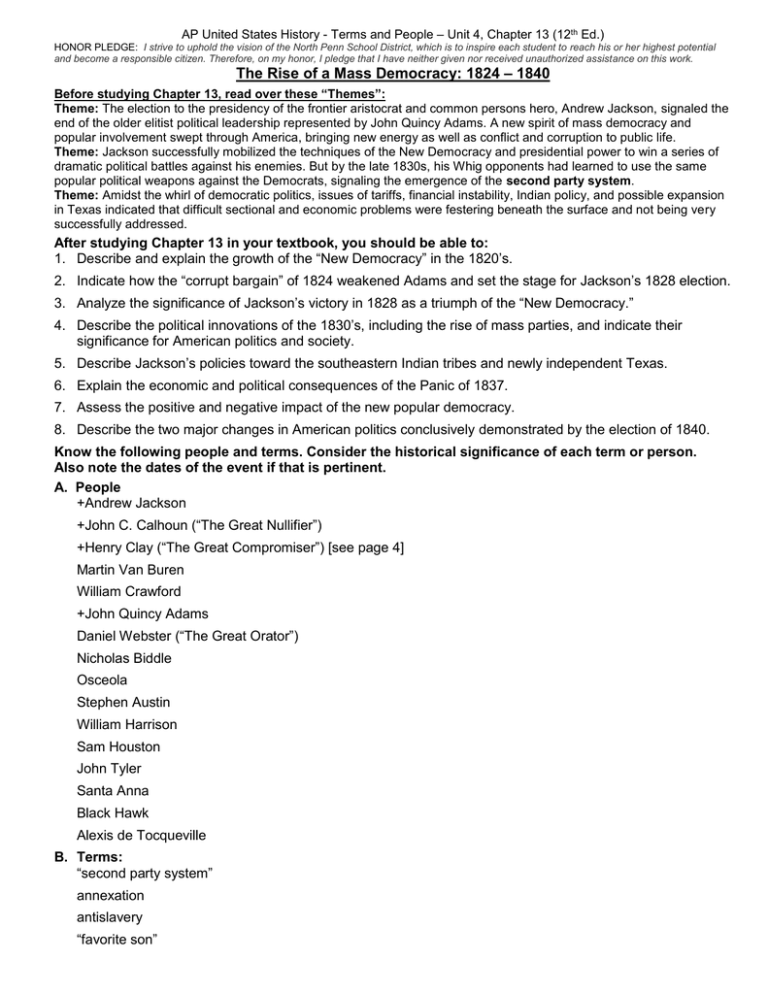
AP United States History - Terms and People – Unit 4, Chapter 13 (12th Ed.) HONOR PLEDGE: I strive to uphold the vision of the North Penn School District, which is to inspire each student to reach his or her highest potential and become a responsible citizen. Therefore, on my honor, I pledge that I have neither given nor received unauthorized assistance on this work. The Rise of a Mass Democracy: 1824 – 1840 Before studying Chapter 13, read over these “Themes”: Theme: The election to the presidency of the frontier aristocrat and common persons hero, Andrew Jackson, signaled the end of the older elitist political leadership represented by John Quincy Adams. A new spirit of mass democracy and popular involvement swept through America, bringing new energy as well as conflict and corruption to public life. Theme: Jackson successfully mobilized the techniques of the New Democracy and presidential power to win a series of dramatic political battles against his enemies. But by the late 1830s, his Whig opponents had learned to use the same popular political weapons against the Democrats, signaling the emergence of the second party system. Theme: Amidst the whirl of democratic politics, issues of tariffs, financial instability, Indian policy, and possible expansion in Texas indicated that difficult sectional and economic problems were festering beneath the surface and not being very successfully addressed. After studying Chapter 13 in your textbook, you should be able to: 1. Describe and explain the growth of the “New Democracy” in the 1820’s. 2. Indicate how the “corrupt bargain” of 1824 weakened Adams and set the stage for Jackson’s 1828 election. 3. Analyze the significance of Jackson’s victory in 1828 as a triumph of the “New Democracy.” 4. Describe the political innovations of the 1830’s, including the rise of mass parties, and indicate their significance for American politics and society. 5. Describe Jackson’s policies toward the southeastern Indian tribes and newly independent Texas. 6. Explain the economic and political consequences of the Panic of 1837. 7. Assess the positive and negative impact of the new popular democracy. 8. Describe the two major changes in American politics conclusively demonstrated by the election of 1840. Know the following people and terms. Consider the historical significance of each term or person. Also note the dates of the event if that is pertinent. A. People +Andrew Jackson +John C. Calhoun (“The Great Nullifier”) +Henry Clay (“The Great Compromiser”) [see page 4] Martin Van Buren William Crawford +John Quincy Adams Daniel Webster (“The Great Orator”) Nicholas Biddle Osceola Stephen Austin William Harrison Sam Houston John Tyler Santa Anna Black Hawk Alexis de Tocqueville B. Terms: “second party system” annexation antislavery “favorite son” AP United States History - Terms and People – Unit 4, Chapter 13 (12th Ed.) HONOR PLEDGE: I strive to uphold the vision of the North Penn School District, which is to inspire each student to reach his or her highest potential and become a responsible citizen. Therefore, on my honor, I pledge that I have neither given nor received unauthorized assistance on this work. common man nullification spoils system / patronage rotation in office Democratic-Republicans Anti-Masonic party “Revolution of 1828” Twelfth Amendment “King Mob” “corrupt bargain” Tariff of Abominations South Carolina Exposition Tariff of 1832 Specie Circular “slavocracy” Tariff of 1833 “Trail of Tears” Panic of 1837 Force Bill Seminole Indians Divorce Bill Bank of the United States Lone Star independent treasury “pet” banks +=One of the 100 Most Influential Americans of All Time, as ranked by The Atlantic. Go to Webpage to see all 100. *=A 100 Milestone Document from the National Archive. Go to Webpage to link to these documents. C. Sample Essay: Using what you have previously learned and what you learned in Chapter 13, you should be able to answer essays such as these: The new “mass democracy” of the 1820s and 1830s would not have developed without a popular hero like Andrew Jackson. Assess the validity of this statement. D. Voices from the past: It gives me pleasure to announce to Congress that the benevolent policy of the Government, steadily pursued for nearly thirty years, in relation to the removal of the Indians beyond the white settlements is approaching to a happy consummation. Two important tribes have accepted the provision made for their removal at the last session of Congress, and it is believed that their example will induce the remaining tribes also to seek the same obvious advantages. *President Andrew Jackson's Message to Congress “On Indian Removal”, December 6, 1830 E. Historians have divided American political history into five “Party Systems” First Party System: The Founding (1789 - 1824) Two Party System First Two Parties o Federalists (Hamilton) o Democratic-Republicans (Jefferson & Madison) Local Influence End of the Federalist Party Second Party System: Jacksonians (1828 - 1854) Rise of the Democratic Party Party Organization o Organized the party at local levels Rise of the Whig Party AP United States History - Terms and People – Unit 4, Chapter 13 (12th Ed.) HONOR PLEDGE: I strive to uphold the vision of the North Penn School District, which is to inspire each student to reach his or her highest potential and become a responsible citizen. Therefore, on my honor, I pledge that I have neither given nor received unauthorized assistance on this work. F. Map Work: Identify the places indicated by the reference numbers on the map below. _____ Indian Territory _____ Everglades _____ Texas _____ Alamo _____ Goliad _____ San Jacinto _____ ___________________________ E. Path of Indian Removal, including the Trail of Tears, as federal removal policy forced the relocation of Southeastern tribes to Indian Territory (Oklahoma) G. Who was Henry Clay? Read on to find out: AP United States History - Terms and People – Unit 4, Chapter 13 (12th Ed.) HONOR PLEDGE: I strive to uphold the vision of the North Penn School District, which is to inspire each student to reach his or her highest potential and become a responsible citizen. Therefore, on my honor, I pledge that I have neither given nor received unauthorized assistance on this work. Henry Clay (1777-1852) – The Great Compromiser Text by Thomas Rush. He was one of the most partisan, hot-headed, and polarizing politicians of his day. Yet he was also a statesman possessing an unsurpassed ability for brokering differences, for finding the middle ground, for soothing and consoling opposing passions into compromise and reconciliation. At one point in his career he was dubbed "The Dictator" by some of his Senate colleagues. But his most lasting fame and greatest contribution to his country was achieved in the role of "The Great Compromiser," the man who held together the Union. Henry Clay failed in his all consuming ambition to become President of the United States. "I would rather be right than President," was his most famous remark, and probably one of the greatest utterances of political sour grapes of all time. Yet in failing in his fondest goal he became perhaps the foremost legislator America ever produced. He served as Speaker of the House longer than any man in the 19th Century, transforming the office from a mere presiding function into one of enormous power and influence. In 1957 a Senate committee, headed by John F. Kennedy and charged with the task of honoring it's most distinguished past members, named Clay the greatest Senator in the country's history. His service to and impact on the country far exceeded, with one notable exception, that of nearly every President of his era. We tend to remember and measure our history by our Presidents, in the steady rhythm of the office's constant four year electoral increments. Since we lack a monarch the men occupying the Presidency have become the embodiment of the nation, and the definers of their epochs. Washington was The Father of The Country. Lincoln became The Great Emancipator and The Savior of The Union. We speak of The Age of Jefferson, The Age of Jackson, and The Age of Roosevelt. There is The Reagan Era and The Kennedy Years. Teddy Roosevelt and Woodrow Wilson are the embodiment of The Progressive Era. Eisenhower is the smiling grandfatherly icon of the 1950s. Even the negative history takes on a Presidential aura. Grant becomes of the poster boy for the corruptions of Gilded Age. Hoovervilles sprout across the landscape of the Great Depression. A haggard Lyndon Johnson reigns over the chaos and trauma of the Viet Nam Era. And a sullen Richard Nixon is wrapped in the purple robes of the Imperial Presidency, symbolizing the abuse of executive power arising from the Watergate Scandals. But legislators tend to be generally forgotten. Few are remembered past their time and outside of the state or district they represented. There is no Senator's Day, no three day week-ends in honor of past members of the House of Representatives, no department store sales or car clearances in homage to The Congress. Perhaps a distinguished member ends up with a highway or a dam or a school named after him. Maybe a charitable or scholarly foundation is established in their honor, and as is often the case, the foundation achieves more lasting recognition than the person it was named after. Lasting historical fame for a politician seems to require the Presidential Seal. And so it is with Henry Clay. Few Americans outside of his home state of Kentucky could identify him or attach any achievement to his name. Maybe they vaguely recall the name from some long ago high school class or college American History survey. Something about a compromise, or he ran for President and lost. But, generally speaking, the man is almost totally forgotten by anyone who hasn't more than scratched the surface of our political history. In the era from 1810 through the early 1850s, only Andrew Jackson could be said to have had more impact. And perhaps this is where the problem of Clay's relative public obscurity lies. For Andrew Jackson and Henry Clay were bitter, acrimonious rivals, with Jackson proving to be the ultimate political winner of their long struggle. Clay was defeated and history usually most remembers the winners. Only Daniel Webster could match him for his oratory. In an age when public speaking was not only a high art but a form of public and political entertainment, Clay was the chief practitioner. He had a voice like a pipe organ and an actor's sense of theatrics that stirred all who ever heard him. When Mr. Clay was going to speak the galleries would be packed to overflowing and would often have to be cleared because of the uproarious responses his speeches would receive. And he had an intangible presence about him that drew people, even some of his opponents, under his spell. When a new member of the House was once asked if he wished to meet The Speaker he replied, "I do not wish to meet Mr. Clay. He is my opponent and I do not wish to subject myself to his fascination." His long time colleague and rival John C. Calhoun once supposedly remarked, "I don't like Clay. He is a bad man, an imposter, a creator of wicked schemes. I wouldn't speak to him, but, by God, I love him." Andrew Jackson had no such positive feelings for him at all. Not a shred. He characterized him as "the basest, meanest, scoundrel that ever disgraced the image of his god...," branded him "The Villain," a characterization taken up by many historians over the years, and stated near the end of his life that he only regretted that he had not shot Henry Clay and hanged John C. Calhoun. Of course Clay was no more generous himself, calling the President, among other things, "ignorant, passionate, hypocritical, corrupt, and easily swayed by the basest men around him," a characterization which another set of historians often applied to Jackson. These two great leaders despised each other with a fury rarely approached in American history. Even Hamilton and Jefferson had better relations and more respect for each other. The irony is that Jackson and Clay, in many ways, were so much alike, not only in background and career, but, in some regards, in terms of temperament as well.
